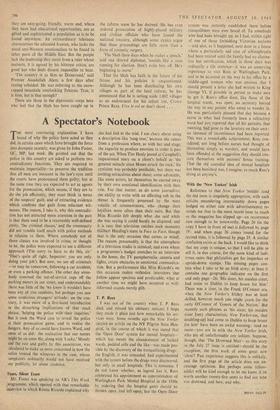T. P. Rees I was out of the country when
T. P. Rees died, and missed his obituary notices; I hope they made it plain just how remarkable his ser- vices Were. Some months ago the New Yorker carried an article on the NY Pilgrim State Hos- pital, in the course of which it was stated that the 'Open Door' system for mental hospitals— which has meant the abandonment of locked wards, padded cells and the like—was made pos- sible by the discovery of the tranquillising drugs: the English, it was conceded, had experimented with the system before the drugs were discovered, but only in small hospitals. This is nonsense. I do not know whether, as legend has it, Rees celebrated his appointment as superintendent of Warlingham Park Mental Hospital in the 1930s by ordering that the hospital gates should be thrown open, and left open; but the Open Door system was certainly established there before tranquillisers were ever heard of. To somebody who had been brought up, as I had, within sight of one of those forbidding Victorian asylums —and also, as it happened, next door to a house where a particularly sad case of schizophrenia had been treated until the family had no alterna- tive but certification, which in those days was ordinarily a life sentence—it was an unnerving experience to visit Rees at Warlinghain Park, and to be accosted on the way to his office by a middle-aged woman who was anxious that I should present a letter she had written to King George VI, if possible in person to make sure he got it. Rees's office door, like those of the hospital wards, was open; no secretary barred the way to any patient Ikho cared to wander in. He was particularly pleased that day because a nurse in what had formerly been a refractory ward had just reported that all his patients, that morning, had gone to the lavatory on their own: no instance of incontinence had been reported. This was a remarkable achievement, Rees con- sidered; not long before nurses had thought of themselves simply as warders, and would have been offended at the suggestion they should con- cern themselves with patients' house training. That the old custodial idea of mental hospitals has been banished was, I imagine, as much Rees's doing as anyone's.






























 Previous page
Previous page